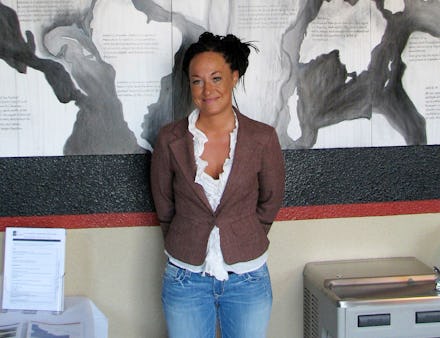Rachel Dolezal's flawed comparisons of race and gender are the epitome of white privilege

Rachel Dolezal is the story that just won't go away. Her new book, In Full Color, hits bookshelves Tuesday.
And, to be honest, members of the media have to accept our fair share of responsibility for this. Dolezal says outrageous things — like how a Nigerian tribesman told her she has a "high-frequency Nubian soul" and thus bestowed upon her a new name — and we cover it.
But at the risk of further publicizing what can only be described as one woman's off-kilter spectacle, there's at least one part of Dolezal's story that's worth scrutinizing a bit more closely. Time and time again, she's said her "transracial" identity is akin to being transgender, only hers is less understood and even more taboo.
"There's more stigma for race fluidity than gender fluidity," Dolezal told Salon.
With this comparison, Dolezal effectively turns herself into a martyr — in her mind choosing the tougher path, even though there are black people on one side and white people on the other, throwing stones at her as she waltzes courageously down the middle. She's the tragic mulatto whose tragedy is completely self-induced, but those stones still hurt. In Dolezal's eyes, she's a woman who is boldly and publicly treading her own path, despite what the world might think and to great financial and social peril.
For Dolezal, being a white ally wasn't enough. She completely disavowed her whiteness, not only aligning herself with the black community but also embedding herself in it. She taught African-American history courses at a local community college and led her local NAACP chapter. She married a black man, had black children, claimed only black family members. She reportedly accused colleagues of racism, claimed she was being discriminated against for being a "light-skinned black woman" and reported hate crimes that didn't happen.
Here's Dolezal's reasoning: She grew up thinking of herself as a brown-skinned woman with kinky hair. In her TEDx talk, she described drawing self-portraits to this effect when she was a child. But she learned early on that there were unspoken but strictly enforced rules to America's color line, so she spent the first three decades of her life hiding her true identity. Then she read books on racial construction, books by black women, books that detailed how race was just a social construction invented to justify racism and slavery.
So she tanned her skin, chemically altered her hair and began to live life as her authentic, black self. However, she's careful to point out she isn't "African-American," but "black" or "pan-African," meaning hers is a political identity more than a biological one — even though she bizarrely attempts to imitate those physical traits she says don't really exist.
"I believe that race is a social construct," Dolezal told CNN on Saturday.
It's true race and gender are social constructs. There are, by and large, physical traits shared by people assigned to those constructs. But those traits are only given meaning by the society in which those people live — and that meaning has very real consequences. After World War II, millions of white men were able to forge middle-class suburban lives, thanks to the G.I. bill and strict housing regulations that excluded black families. Women, who already have a tough time breaking into the tech world, often face unbridled sexist discrimination once they're there.
Quiet as it's kept, race has always been somewhat malleable in American society. There are few, if any, genetically "pure" white or black people in this country. And our constructs of race have even changed over the years. But gender has been much more strictly enforced, even though its roots are even more nebulous. Gender is often conflated with sex — people assigned male at birth are to grow up and become men, while people assigned female are to grow up and become women.
The push by transgender and gender-nonconforming people in recent years has been to acknowledge that in reality, we all exist on a continuum that's impossible to identify at birth. While Dolezal could seemingly have lived under the radar, trans people don't hide despite facing real — and sometimes deadly — danger because their identity is seen as a threat. Dolezal was perfectly content to pass herself off as a black woman until her parents "outed" her in 2015.
Until then, Dolezal was doing what so many light-skinned black people had been doing for centuries — "passing" as the opposite race, only in reverse, she said during a Facebook Live interview with the New York Times. In this way, she had much more to lose. Whereas black people who passed did so for safety and the social and financial benefits of white privilege, she made a choice to lose those privileges. Things have only gotten harder since she was "outed," Dolezal said. She hasn't been able to find a job, a circumstance that forced her to publish a memoir and go on the road to the nation's top publications to publicize it.
Put simply: Rachel Dolezal is the very worst of white privilege. There is no separating yourself from the systems that created you. But here's Dolezal, insisting she's got it harder than everyone else and pleading with us to accept her deception as courage.
It's not. And we won't.